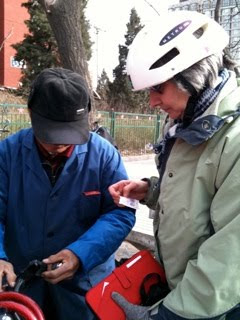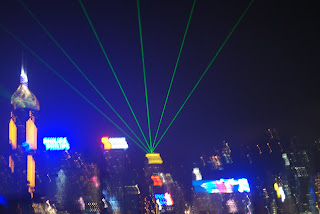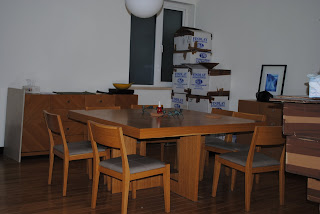Well, maybe you can be a kid again. Get your bike and get in the bike lane on a nice spring day - an entire city to explore, with your own lane, your own little traffic lights and blue direction signs - and go for a ride. The bike lane on many roads is protected from traffic by a little white picket fence 18 to 24 inches tall; sort of like the white wire fences you might use to edge a flower garden, only made of a much heavier gauge of steel. Mounted in concrete blocks or water-filled blocks, it creates a very private lane for bike traffic. On some roads, of course, the bike lane is defined merely by a painted line on the road, but around our apartment the major roads all have a fenced off lane; which is very good for keeping the buses away.
Of course the excitement is not purely from the joy of a safe and serene ride through a major city like Beijing in your own bike lane, it is also from the on-coming traffic. Because many of the roads in Beijing are big – six lane highway in the middle, three lanes of traffic in each direction on the “street”, a right turn lane and one or more left turn lanes at major intersections, plus of course a bike lane on each side – crossing the street is a pain, not too mention a five minute exercise if you have to cross in two directions. So what people do is ride the wrong way.
So there you are feeling sunny and warm, having a leisurely ride down your bike lane, when the cry of “Oncoming! Oncoming!” disrupts the peace. This cry of warning can range from a mild reminder to look up and avoid an elderly man or woman riding one of Beijing’s many look-a-like beat up old bicycles, which from their dusty and corroded appearance you’d think Mao himself had taken them on the Long March, to a warning with the urgency of the battlefield cry of “incoming” as some deranged delivery van driver careens up the bike lane on a short-cut to his next stop. Your bike lane which a moment ago seemed peacefully separated from traffic now seems like a death trap as it generally has the sidewalk curb on one side, possibly lined with parked cars, and that nice little fence separating the bike lane from vehicular traffic on the other, so you can’t escape whatever is coming in the opposite direction. The likely choices are another bike, an electric scooter, a motor cycle, at pedal powered junk cart, and electric junk cart or a three-wheeled enclosed contraption that is a one passenger taxi, a car, an SUV or delivery van. Now other bikes and motor scooters aren’t too bad, but the carts depending on how they are loaded take up quite a bit of space. Everyone slows down and somehow squeezes by.
When the bike lane isn’t hemmed in with a little fence the convention seems to be that the wrong way riders hug the curb. Not sure why. Maybe the theory is the slight swell of the bike traffic out into the vehicular lanes will just nudge everyone over a little. Maybe there is an aversion to head on collisions? Maybe it is just faith in the unseen driver behind you not to run you down. After a few rides you learn to cut-off the buses to avoid the “oncoming” just like a native.
The other sign that your bike lane life is achieving native status is that you too will ride the wrong way, at night, without a light, and hug the curb. If my children did this I would definitely be taking their bikes away! I did wear my helmet, which makes me a complete oddity in the bike lane. Helmets just aren’t done - must mess up the hair or something. Diane and I did this the other night coming home from the tailor shop and were just commenting to each other how odd the situation was when we were passed in the bike lane, going in the wrong direction, by a Land Rover doing the same thing!
There are other traffic hazards in the bike lane as well. One stems from the fact that battery powered motor scooters are very popular. With a top speed of about 2 to 3 times of a bike at its fastest, they are the speed demons of the bike lane. And, they are completely silent. You can’t hear them coming up behind you, although most of the drivers will beep their horn in your ear several times, there are plenty of times when you don’t know you are about to be passed by a “swerving-dervish” until he appears six inches off your left elbow. It’s a bit unnerving. Same for those headed in the wrong direction. If you are looking at the road for pot holes etc, you don’t hear the traffic approaching head on. 360 degree awareness is needed at all times. Another hazard is the old and slow riders entering the lane without looking. Diane was viciously cut off by an old guy pedaling a yam-roaster. Basically a three wheeled bike with a 55-gallon drum of the back for building a charcoal fire and using it to roast yams for sale. They seem to move up and down the main roads catering to people waiting for the bus.
The worst traffic hazard is cars turning right – or what I have come to think of as the “right turn terrorists.” For some reason, everyone who makes a right turn in China seems to believe they have the right of way. As a car driver, you do not yield to bikes in the bike lane which you have to cross to turn right. You do not yield to pedestrians in the cross-walk, even when they have the walk sign. Stop at a red light before proceeding to turn right? Never! And of course you don’t yield to traffic traveling on the road you are turning onto, you just plow right in. This is all very different from New York where you can pretty much cross with the light and expect the cars to stop for you, or CA where most drivers will at least slow down if not stop as soon as you step off the curb. I think this is the single biggest hazard of Beijing traffic.
There isn’t anyone wearing Hugo Boss in the bike lane. The average bike lane rider has jeans or khaki’s, about three jackets, gloves, and all varieties of wool caps to keep their ears from freezing off. Once in a while you see some office workers heading in to work in a shirt and tie on their electric scooters. My secretary rides her bike to work, both for exercise and to save the subway fare of 4 RMB a day (about 60 cents). She changes out of her jeans at the office. In the main, however, the bike lane seems to be a blue-collar experience. It is how our newly hired Ayi (maid) gets from home to work and from client to client. As a result the bike lane is pretty crowded at shift change times, 7 to 8 in the morning, and 3 to 5 in the evening. But it’s not like the “old days” of even 10 years ago when bikes far out numbered cars. Now it seems that the 4 million cars on Beijing’s streets are in the majority – which makes the bike lane a good choice for whizzing past grid-locked traffic.
Of course the Chinese tendency to adopt the expedient approach to any given problem means that when traffic gets jammed it naturally seeks the path of least resistance and that means cars, trucks and possibly buses start using the bike lane. Sometimes to the extent that even the bike lane grinds to a halt. This has only happened to us once so far, but a traffic delay caused by a large theatre event on the East Third Ring Road blocked the bike lane. Usually the cars leave enough space for a single bike to squeeze by along the curb. But since the bike lane is also used by pedal powered pick up trucks, which are three-wheeled carts the width of about two and half bike riders they can’t get through. Thus the bike lane is grid-locked just like the rest of the lanes. Of course single cyclists like us can solve the problem by putting on our “Chinese” thinking caps and either (a) ride on the sidewalk with the pedestrians or (b) ride in the wrong direction in the bike lane on the other side of the road. We’ve done both!
The bike lane has its own set of service stations. No need to compete with cars at the gas station. The bike lane has frequent repair shops to cater to the cyclists every need. Well, most mechanical needs; there are no convenience stores for snacks or toilets. These bike shops are generally mobile affairs using a pedal powered three wheeled cart with a large metal box on it containing supplies. The owner will park on a street corner, more or less out of the way, and get out an assortment of tires, inner tubes, wrenches (spanners for UK readers), a pump, a pan of water and a small stool and pretty much be open for business. We have a regular guy on the corner about a block from our apartment who is generally open for business from about 7 am to dark, which right now works out to a 12 hour day. I haven’t patronized his “shop” yet, but I’m intending to buy a bell and a basket for my bike. Diane got a good bell for her bike from a similar guy in another part of the city, installed, for less than a dollar.
The bike lane has its own parking facilities as well. Most office buildings, malls, and shops have designated bike parking areas – sometimes with a wrack, sometimes covered, sometimes just a space on the sidewalk. And like parking lots for cars, some of them have attendants and fees. Diane and I stopped at one of the large grocery stores, Jinkalong, and parked our bikes in the row out front. As we were headed in the attendant came over and said something in Chinese, which we didn’t understand, so I offered him money (a common solution to almost every problem of any size or shape here). This seemed to produce an explanation that you pay on the way out based on time. I think I understood one word and guessed the rest. We came out a short time later and sure enough the attendant strolled over to collect. It cost us 30 Mao to park two bikes for 15 or 20 minutes. That works out to 9 or 10 cents per hour for attendant supervised parking right at the front door. Parking cars is also inexpensive. I believe the charge for 12 hours in the parking garage beneath our office building is 50 yuan, or about $8 a day.
I’m planning to enjoy life in the bike lane as often as possible. That and not hiring a car and driver will be my contribution to China’s increasing (slow but increasing) social responsibility efforts. It may not make much of a difference, but at least the joy of riding in the bike lane will make me feel like the sky is blue!




































